|
| |
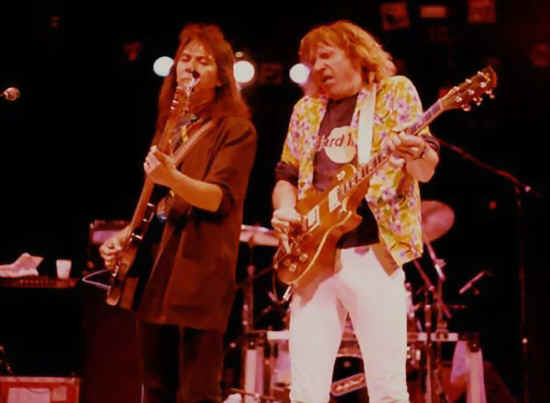
From his early hits with the James Gang through to his tenure with the Eagles - as
well as a successful solo career - Joe Walsh remained one of the most colorful characters
in rock & roll, lending his distinctively reedy vocals, off-the-wall lyrics, and
expansive guitar leads to a series of AOR staples including "Funk #49,"
"Rocky Mountain Way," and "Life's Been Good." Born November 20, 1947
in Wichita, KS, Walsh initially studied the oboe and clarinet, later playing bass in local
bands the G-Clefs and the Nomads; while attending Kent State University, he finally picked
up the guitar, fronting the collegiate combo the Measles from 1965 to 1969. He then joined
the Cleveland-based hard rock trio the James Gang, appearing on their debut LP Yer' Album.
The trio's 1970 album, The James Gang Rides Again, proved the group's commercial
breakthrough, launching the FM radio favorite "Funk #49" and achieving gold
status. While the follow-up, Thirds, was another success, yielding the classic "Walk
Away," Walsh found the James Gang's power-trio format too confining and left the
group soon after.
After relocating to Colorado, Walsh formed a new group, Barnstorm, recorded a
self-titled 1972 LP before making his proper solo debut the following year with The Smoker
You Drink, the Player You Get. The record cracked the Top Ten on the strength of the pop
hit "Rocky Mountain Way" and was followed in 1974 by So What. In the wake of
1976's You Can't Argue with a Sick Mind, Walsh replaced guitarist Bernie Leadon in the
hugely popular West Coast rock quintet the Eagles, making his debut on their best-selling
Hotel California album. He also continued his solo career, issuing But Seriously, Folks in
1978; the record's highlight, the hilarious "Life's Been Good" - a dead-on
portrait of rock star debauchery - became his biggest pop hit, nearly reaching the Top
Ten. In 1979, Walsh announced his campaign for President of the United States, promising
"free gas for everyone" if he won (he didn't.) The Eagles' final studio album,
the chart-topping The Long Run, appeared that same year.
The soundtrack to the film Urban Cowboy generated Walsh's next solo smash, "All
Night Long," which cracked the Top Twenty in the summer of 1980; although 1981's
There Goes the Neighborhood featured his final Top 40 entry, "A Life of
Illusion," he continued recording steadily, resurfacing in 1983 with You Bought
It-You Name It and issuing The Confessor two years later. In between, Walsh ran for the
vice presidency, again unsuccessfully. Following 1987's Got Any Gum?, he toured with Ringo
Starr's All-Starr Band, returning to his solo career for 1991's Ordinary Average Guy. In
1994 he joined the reunited Eagles for their blockbuster Hell Freezes Over tour and
remained on the road as a solo act for years to come.
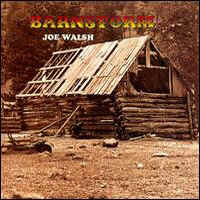
Barnstorm - 1972
Here is where it all started. Walsh's hyper-productive solo career began with this
album, Barnstorm. Featuring the would-be regular talents of Joe Vitale (drums, percussion,
flute and backing vocals) and Kenny Passerelli (bass and vocals), Barnstorm led the way
for subsequent Joe Walsh albums. The mix of slow, reserved tracks and heavy-rock riffs
that lead into big, beefy solos was a much-similar formula to the style he would use
throughout this era.
Barnstorm features many Joe Walsh classics, including the incredibly raucous "Turn
to Stone". Walsh here performs one of his most incredible guitar solos, backed by
multiple layers of heavily distorted guitar. "Mother Says", "Here We
Go", and "Comin' Down" are all highlights of Joe's solo releases, and are
all featured on Barnstorm. Indeed, this is one of the most enjoyable albums of the decade
as well as being a benchmark for Joe Walsh. - Ben Davies
01 - (5:05) Here We Go
02 - (3:21) Midnight Visitor
03 - (1:19) One And One
04 - (4:24) Giant Bohemoth
05 - (6:33) Mother Says
06 - (3:48) Birdcall Morning
07 - (2:58) Home
08 - (4:01) I'll Tell The World About You
09 - (5:25) Turn To Stone
10 - (1:55) Comin' Down

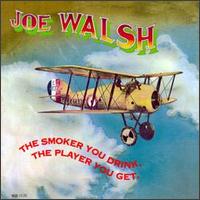
The Smoker You Drink, The Player You Get - 1973
The Smoker You Drink, the Player You Get, Walsh's second solo studio album, continues
the heavy and light rock mix of tracks found on his previous release Barnstorm. Indeed,
the opening two tracks bear this out. The first, perhaps Joe Walsh's most recognized
track, "Rocky Mountain Way", comes replete with overly distorted guitars and the
obligatory solo. The next song, "Bookends", is a tuneful ode to happy memories.
Walsh's ability to swing wildly from one end of the rock scale to the other is
unparalleled and makes for an album to suit many tastes.
Joe Vitale (drums, flute, backing vocals, keyboards, and synthesisers a talented man)
and Kenny Passarelli (bass and backing vocals) are once again employed, and once again
prove themselves adept at handling Walsh's various styles. The album sees an addition to
the backing band in the form of Rocke Grace on keyboards and vocals. The legendary Bill
Szymczyk works along with Walsh to handle the production, and takes care of the mixing.
Szymczyk's work on this area is as always astounding.
The Smoker You Drink, the Player You Get features some of the most remembered Joe Walsh
tracks, but it's not just these that made the album the success it was. Each of the nine
tracks is a song to be proud of. This is a superb album by anyone's standards. - Ben
Davies
1 - (5:17) Rocky Mountain Way
2 - (2:48) Book Ends
3 - (3:12) Wolf
4 - (3:40) Midnight Moodies
5 - (2:42) Happy Ways
6 - (4:45) Meadows
7 - (5:42) Dreams
8 - (6:00) Days Gone By
9 - (1:56) Day Dream (Prayer)

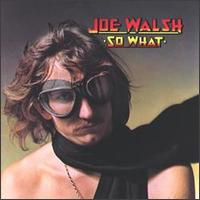
So What - 1975
Walsh's catalog by this point was two albums strong and of a consistently high quality.
Despite a change of staff for So What - a wide range of musicians are used, including the
Eagles' Don Henley - the sound is very similar to previous releases. A number of classic
Joe Walsh tracks are featured including a more polished version of "Turn to
Stone", originally featured on Walsh's debut album Barnstorm in a somewhat more
riotous style. "Help Me Thru The Night", Joe Walsh's mellowest song to date, is
helped along by some fine lead and backing vocals from the band.
So What sees Joe Walsh in top gear as a guitarist. Most of the nine tracks feature
solos of unquestionable quality in his usual rock style. The classic rock genre that the
man so well defined with his earlier albums is present here throughout, and it is pulled
off with the usual unparalleled Joe Walsh ability. - Ben Davies
1 - (5:13) Welcome To The Club
2 - (5:00) Falling Down
3 - (1:59) Pavanne
4 - (4:28) Time Out
5 - (1:04) All Night Laundry Mat Blues
6 - (3:52) Turn To Stone
7 - (3:41) Help Me Thru The Night
8 - (6:52) County Fair
9 - (4:41) Song For Emma

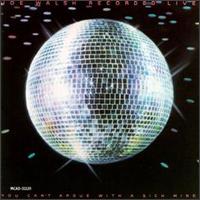
You Can't Argue With A Sick Mind - 1976
Recorded live just before Joe joined up with the Eagles full-time, You Can't Argue...
contains six of Joe's better-known songs. Things start off with his last hit with the
James Gang, "Walk Away," and then makes its way through "Meadows" and
eighteen minutes of "Rocky Mountain Way." The crowd loved it. Follow all that
with "Time Out," then do "Help Me Thru the Night" acoustically with
future bandmates Henley, Frey, and Felder helping out, and close things up with a profound
and majestic "Turn to Stone," and you've got one heck of a Joe Walsh concert
souvenir. - James Chrispell
1 - (3:23) Walk Away [Live]
2 - (7:10) Meadows [Live]
3 - (7:43) Rocky Mountain Way [Live]
4 - (4:24) Time Out [Live]
5 - (3:45) Help Me Make It Through The Night [Live]
6 - (8:47) Turn To Stone [Live]

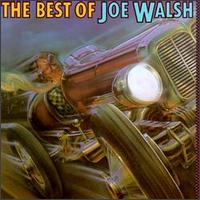
The Best Of Joe Walsh - 1978
The Best of Joe Walsh is a concise, nine-track collection split between James Gang hits
like "Funk #49" and early solo hits like "Rocky Mountain Way." Since
this lacks his best song, "Life's Been Good," as well as any of his '80s
album-rock hits, this is not even close to a comprehensive collection, but it's not a bad
sampler for extremely casual fans. - Stephen Thomas Erlewine
1 - (4:01) Turn To Stone
2 - (5:43) Mother Says
3 - (3:52) Help Me Thru The Night
4 - (5:17) Rocky Mountain Way
5 - (4:44) Meadows
6 - (6:52) County Fair
7 - (3:52) Funk #49
8 - (4:19) Time Out
9 - (3:53) Walk Away

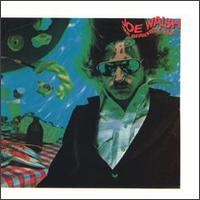
But Seriously Folks - 1978
As far as studio albums go, But Seriously Folks is Joe Walsh's most insightful and
melodic. But Seriously Folks, released in 1978, was the album the Eagles should have made
rather than the mediocre The Long Run. It captures a reflective song cycle along the same
thematic lines of Pet Sounds, only for the '70s. The album's introspective outlook glides
through rejuvenation ("Tomorrow," "Over and Over"), recapturing the
simple pleasures of the past ("Indian Summer"), mid-career indecision ("At
the Station," "Second Hand Store"), and a melancholy instrumental
("Theme From Boat Weirdos"). The disc's finale, "Life's Been Good," is
a sarcastic and bittersweet ode to Walsh's "rock star-party guy" persona which
reached the Top 10 on the pop charts and became a staple of FM rock radio. The only way
But Seriously Folks could have been improved, was to include "In the City,"
essentially solo Walsh, which unfortunately ended up on The Long Run instead. - Al
Campbell
1 - (4:54) Over And Over
2 - (3:36) Second Hand Store
3 - (3:04) Indian Summer
4 - (5:10) At The Station
5 - (3:40) Tomorrow
6 - (1:25) Inner Tube
7 - (4:43) Theme From Boat Weirdos
8 - (8:58) Life's Been Good

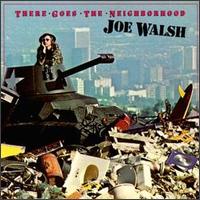
There Goes The Neighborhood - 1981
Joe Walsh's long and varied career has had its ups and downs, to say the least. Here,
you see Walsh in good old rock form. The opening track, "Things," pretty much
defines it all: drum beat intro, a simple riff kicks in, a few synths, and then Walsh's
lead - it's this simple formula that gives the album its charm. This is early '80s rock in
its most entertaining and fun form. Walsh's lead guitar is, as always, breathtaking. The
rock legend's trademark sound is prominently featured throughout the album, and
undoubtedly here he performs some of his finest solos. The only qualm that one can pick is
that the whole album is in a much-similar vein. This is classic rock, though: once you
start, you want more. There Goes the Neighborhood is by far one of Joe Walsh's greatest
works, particularly from this era. Indeed, after the three-year absence in solo releases,
Walsh proved himself ready and able to adapt to the sound of the time with shocking
ability. - Ben Davies
1 - (5:43) Things
2 - (4:20) Made Your Mind Up
3 - (3:12) Down On The Farm
4 - (5:02) Rivers (Of The Hidden Funk)
5 - (3:32) A Life Of Illusion
6 - (4:27) Bones
7 - (3:55) Rockets
8 - (5:14) You Never Know

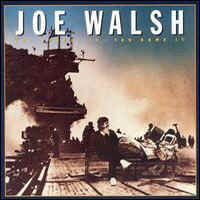
You Bought It: You Name It - 1983
Joe Walsh attempts and nearly makes the free throw that wins the game. Great songs like
"I Can Play That Rock & Roll" and "Space Age Whiz Kids" show he
hasn't lost his edge. But the big claim to fame on this record is his
"I.L.B.T.s" or "I Love Big Tits." Rather retro in feel, like the
title, it harkens back to a wackier time. Good, but flawed. - James Chrispell
01 - (3:09) I Can Play That Rock And Roll
02 - (4:00) Told You So
03 - (4:00) Here We Are Now
04 - (4:44) The Worry Song
05 - (2:54) I.L.B.T. S
06 - (3:43) Space Age Whiz Kids
07 - (3:16) Love Letters
08 - (4:36) Class Of '65
09 - (5:10) Shadows
10 - (3:35) Theme From Island Weirdos

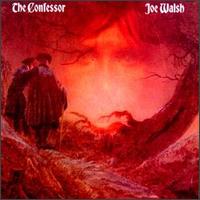
The Confessor - 1985
Joe Walsh just hasn't been able to produce a complete album of great material, and The
Confessor is no exception. Side one is drek, with such titles as "I Broke My
Leg" and "Bubbles." Turn the record over, and we find one of Walsh's
masterpieces. The title tune is great! Over seven minutes of pure Joe Walsh rock with
cryptic lyrics and a socko arrangement. Side two also includes a cover of Michael
Stanley's "Rosewood Bitters" which Walsh played on long ago. Worthwhile for the
title track alone. - James Chrispell
1 - (3:57) Problems
2 - (3:13) I Broke My Leg
3 - (3:34) Bubbles
4 - (4:24) Slow Dancing
5 - (3:54) 15 Years
6 - (7:08) The Confessor
7 - (3:31) Rosewood Bitters
8 - (4:16) Good Man Down
9 - (2:41) Dear John

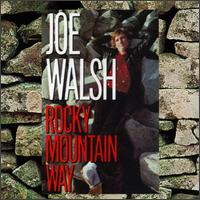
Rocky Mountain Way - 1985
Rocky Mountain Way features only a few tracks which had not previously been released on
Joe Walsh best-ofs. "Country Fair," a rather dull and protracted affair taken
from the 1973 album So What, is a strange addition to the lineup, especially in light of
the fact that neither "Mother Says," "Bookends," or "Here We
Go" (three of the man's finest tracks) are featured. Most of the material on this
release is undeniably enjoyable, however. The superb titular track opens the album and
immediately catches the listeners' attention through its rocking intro. Similarly,
"Turn to Stone," "Meadows," "Wolf," and others are just as
irresistible. Nonetheless, considering both the amount of classic Walsh songs not featured
on Rocky Mountain Way and the many other more extensive and better chosen best-ofs
available, this release is rather pointless. - Ben Davies
01 - (5:19) Rocky Mountain Way
02 - (5:18) Turn To Stone
03 - (6:47) County Fair
04 - (4:40) Meadows
05 - (4:00) I'll Tell the World About You
06 - (5:56) Days Gone By
07 - (3:14) Wolf
08 - (5:12) Welcome To The Club
09 - (4:22) Time Out
10 - (1:52) Comin' Down

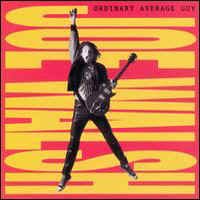
Ordinary Average Guy - 1991
This collection of nostalgia, decent balladry, and quirky anthems probably reinforced
any notions of Joe Walsh's creative decline. The singer/guitarist had (up to the time of
this 1991 release) strung together an incredible career as a soloist and member of several
first-rate rock acts, but time seemed to finally be catching up to him. That's not to say
Ordinary Average Guy is a bad record. It's a fine record, but hardly up to Walsh's own
menacing standard with regard to the musician's legendary guitar groove and wit.
Generally, fans might think of Walsh in contrast to his crooning Eagles cohorts as harder
rocking, edgier, but on this release, the hard-partying guitarist seems more comfortable
showing a softer side. Ballads like "I'm Acting Different" and "Where I
Grew Up" feel more earnest and truthful when compared to campy clunkers like
"Alphabetical Order" and limp commentaries like "Look at Us Now."
Throughout the more upbeat material, oddly placed synth washes and sparse drum patterns
make for a bumpy, uninteresting sonic ride. Released just a couple years before Walsh put
an end to his "30 year party," this reflective, sometimes half-hearted effort
bellies a weariness that's both sad and difficult to appreciate as this master goes
through the motions. - Vincent Jeffries
01 - (3:27) Two Sides To Every Story
02 - (4:16) Ordinary Average Guy
03 - (2:52) The Gamma Goochee
04 - (5:00) All Of A Sudden
05 - (5:03) Alphabetical Order
06 - (4:51) Look At Us Now
07 - (4:35) I'm Actin' Different
08 - (3:59) Up All Night
09 - (4:35) You Might Need Somebody
10 - (2:41) Where I Grew Up (Prelude To School Days)
11 - (5:20) School Days

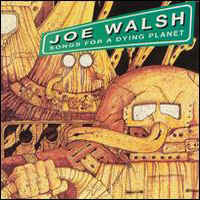
Songs For A Dying Planet - 1993
It's hard not to think when listening to Songs for a Dying Planet that Joe Walsh has a
profound musical statement that he has yet to make. After quite some time away from his
solo recording gig, it figures that a post-sobriety, post-Hell Freezes Over Walsh would
have some interesting things to say, and a few guitar riffs to unleash. This 1999 Sony
release fulfills those expectations to a degree, but the songwriter's weakened comedic
instincts and extreme sincerity make Songs for a Dying Planet a difficult recommendation.
Things start off fierce and promising as two solid rockers ("Shut Up,"
"Fairbanks Alaska") lead into one of Walsh's best songs in many years, the slow
scorcher "Coyote Love." The sublime ballad "I Know" follows, and at
this point Walsh seems to be in a creative zone the likes of which he had not occupied
since the early '80s. The momentum shudders as the listless "Certain Situations"
leads into the bad political lampoon job "Vote for Me." Humor in rock is a
delicate endeavor, and one that Walsh clearly mastered on classics like "Life's Been
Good," but within that almost campy structure existed a palpable edge or even danger.
The self-parody related more than a little first-hand experience and an undefined tragic
subtext that resonated loudly in Walsh's falsetto and his audience as they assessed their
personal reality within the coming post-rock world. No such subtlety or importance exists
on Songs For a Dying Planet (comedic or otherwise.) Everything is stated rather plainly,
as in the sentimental "The Friend Song" where listeners are led directly to the
obvious personal sentiments. In earlier work, Walsh covered the descriptions and listeners
came to their own meaningful or humorous conclusions naturally, on this record (and much
of the musician's work after the mid-'80s) he decides things for himself, and the listener
is forced into a passive response, no longer engaged. - Vincent Jeffries
01 - (3:24) Shut Up
02 - (3:31) Fairbanks Alaska
03 - (4:48) Coyote Love
04 - (1:49) I Know
05 - (4:39) Certain Situations
06 - (4:26) Vote For Me
07 - (1:38) Theme From Baroque Weirdos
08 - (3:37) The Friend Song
09 - (3:30) It's All Right
10 - (4:04) Will You Still Love Me Tomorrow
11 - (12:09) Decades
12 - (2:02) Song For A Dying Planet


Look What I Did: The Joe Walsh Anthology - 1995
A double-disc set that draws from all of the phases of Joe Walsh's career, with the
notable exception of The Eagles, Look What I Did! features almost every worthwhile song
the guitarist ever recorded, even though it does contain pure dreck like
"I.L.B.T.s," which is also known as "I Love Big Tits." - David Jehnzen
Disc 1
01 - (0:41) Tuning, Part 1
02 - (5:57) Take A Look Around
03 - (2:48) Funk # 48
04 - (7:05) The Bomber
05 - (5:31) Tend My Garden
06 - (3:57) Funk # 49
07 - (4:59) Ashes, The Rain And I
08 - (3:35) Walk Away
09 - (4:12) It's All The Same
10 - (3:30) Midnight Man
11 - (5:00) Here We Go Again
12 - (3:10) Midnight Visitor
13 - (5:55) Mother Says
14 - (5:17) Turn To Stone
15 - (1:53) Comin' Down
16 - (4:38) Meadows
17 - (5:44) Rocky Mountain Way
Disc 2
01 - (5:11) Welcome To The Club
02 - (1:00) All Night Laundry Mat Blues
03 - (6:46) County Fair
04 - (3:39) Help Me Thru The Night
05 - (8:06) Life's Been Good
06 - (4:51) Over And Over
07 - (3:33) All Night Long
08 - (3:31) A Life Of Illusion
09 - (3:22) Theme From The Island Weirdos
10 - (3:03) I Can Play That Rock & Roll
11 - (2:53) I.L.B.T.'s
12 - (3:43) Space Age Whiz Kids
13 - (3:29) Rosewood Bitters
14 - (3:16) Shut Up
15 - (12:16) Decades
16 - (2:02) Song For A Dying Planet
17 - (6:07) Ordinary Average Guy [Live]

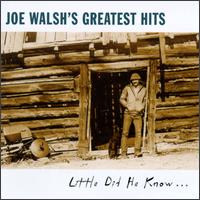
Greatest Hits: Little Did He Know - 1997
The double-disc Look What I Did! was simply too much for anyone but the dedicated Joe
Walsh fan, which makes the release of the 15-song, single-disc Greatest Hits: Little Did
He Know... so welcome. Drawing highlights from his solo career and his early records with
the James Gang, Greatest Hits contains almost every song that most fans would want -
"Funk #49," "Rocky Mountain Way," "Life's Been Good,"
"Meadows," "Turn to Stone," "All Night Long," "A Life
of Illusion" and "Ordinary Average Guy." In other words, it's more
definitive than Look What I Did!, even if it's shorter. - Stephen Thomas Erlewine
01 - (3:57) Funk #49
02 - (5:34) Tend My Garden
03 - (7:04) The Bomber
04 - (3:35) Walk Away
05 - (3:30) Midnight Man
06 - (5:59) Mother Says
07 - (5:18) Turn To Stone
08 - (4:38) Meadows
09 - (5:17) Rocky Mountain Way
10 - (3:38) Help Me Thru The Night
11 - (8:06) Life's Been Good
12 - (3:33) All Night Long
13 - (7:04) The Confessor
14 - (3:31) A Life Of Illusion
15 - (5:13) Ordinary Average Guy

|